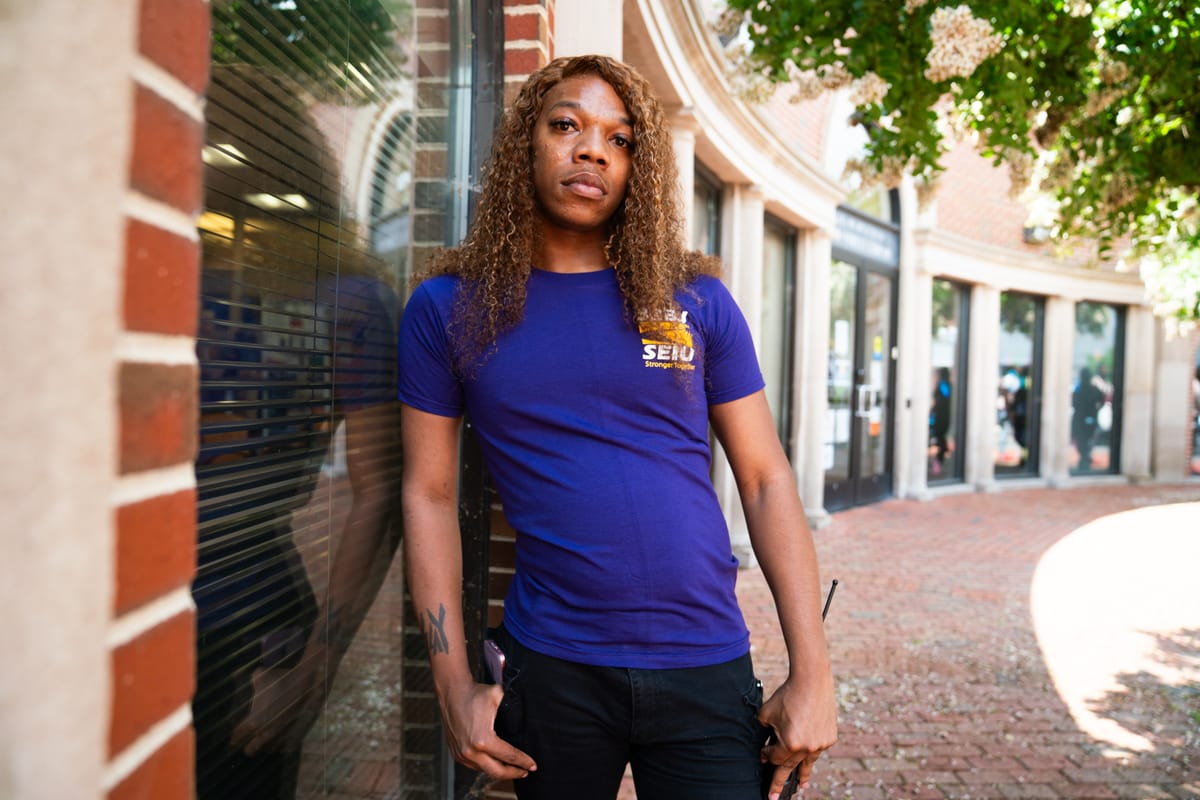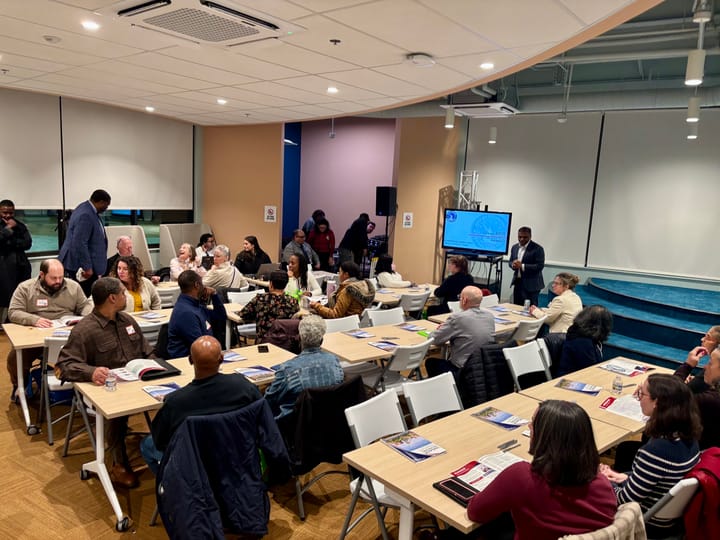
‘Room to breathe’: Contract workers want better pay to clean and protect city buildings
As a security guard who works at several of Richmond’s public libraries, Kyrie Fields, 23, doesn’t qualify for the city’s $20 hourly minimum wage for city employees.
As a young person just trying to get started in life, Fields said in an interview, making a little more would go a long way toward getting an apartment, having enough to pay bills and being able to save a little for emergencies. It would mean less worry about having to stretch each paycheck, Fields said, and more “peace of mind.”
“It’s just a matter of having room to breathe,” said Fields, who currently makes around $15 an hour.
Officials applauded the $20 minimum wage for public employees that was included in the budget passed last year, noting it was almost $8 above the state minimum wage and a significant investment in the people who make city services work.
But it doesn’t apply to all work done for a city government that says it prioritizes equality and livable wages.
Fields is one of a little more than 200 security guards and custodians who work in public buildings but are technically employed by private contractors the city hires to provide those services.
During the city’s recently completed budget process, the City Council expressed overwhelming support for the idea of broadening the $20 minimum wage to cover contracted custodians and security guards. But when it came time to put money in the budget to implement that policy, the Council balked.
Council leaders said they were fully supportive of the idea, but first wanted to do a study on the various options for boosting pay to the workers in question. The study will look at the option of amending the third-party contracts to require the private companies to pay a $20 minimum wage. It will also examine whether it might make more sense for the city to bring the workers “in house” and make them official government employees, as well as the pros and cons of each approach.
Though Council members stressed that the study is a way to achieve a goal they share with labor organizers pushing to expand the minimum wage, several workers like Fields have voiced frustration about what they see as an unnecessary delay.
A city with a $1 billion general fund budget “has the money,” Fields said, but it’s a matter of priorities.
“Everybody up on that podium looking down on us or voting, they have a substantial check coming. And the people looking back at them, don’t,” Fields said.
Policymakers have gotten several differing opinions on how much the move might cost. The Council’s own budget analysts indicated $1.7 million should cover it. The city administration gave an estimate of $3.5 million. Union organizers with SEIU 32BJ — which has been rallying contract workers behind the cause of better pay — project a cost of $1.5 million.
Whatever the cost turns out to be, SEIU organizers have argued the extra cost could easily be absorbed into the city’s budget.
“We thank the Council for recognizing the fundamental justice behind our proposal and for exploring pathways toward living wages for all workers,” SEIU 32BJ district director Jaime Contreraras wrote in a letter to City Council members last month. “Further delays only worsen the unacceptable conditions these workers endure every day, including poverty wages. These are the very individuals who keep our city clean and safe.”
Council discussion and mayor’s stance
Before the Council approved the plan to study the topic, Councilor Kenya Gibson (3rd District) said she hoped it would lead to meaningful action. At a committee hearing last month, Gibson — who sponsored the unsuccessful budget amendment to boost pay for the contract workers — suggested the city take a broader look at how it can better prioritize pro-union companies when awarding contracts.
“I’m proud to live in a city that supports workers and I appreciate our ongoing efforts as a body to to support ensuring that workers have a living wage,” Gibson said. “I am concerned that with the paper as it’s currently written, we’ll end up with a study that could tell us it’s cost-prohibitive to do.”
Councilor Ellen Roberston (6th District), who leads the Finance and Economic Development Committee that vetted the proposal, said she felt the Council was sending a strong signal it wants to pay the workers in question a living wage. The question, she said, is how to get there.
“This research that we are asking the administration to come back to us with, will give us a budget and tell us how much it’s going to cost,” Robertson said. “But we are certainly not expecting a report from the administration that says we can’t afford it.”
In a statement to The Richmonder, Mayor Danny Avula applauded the Council for initiating the study and said the city has taken a “strong step” by adopting a $20 minimum wage for public employees.
“I look forward to reviewing the results of the study and understanding the fiscal and operational considerations,” Avula said. “My commitment remains strong to finding a path in the future that extends the minimum wage to our contracted workforce.”
‘Minimum wage is not working’
Though Virginia recently upped its statewide minimum wage to $12.41 per hour, several workers interviewed by The Richmonder said even $15 isn’t enough to keep up with the rising cost of living.
“Lights, water, that’s going up. Gas,” said Antoine Field, a 50-year-old contract worker who cleans and maintains floors in city buildings. “At $15 an hour, that’s not going to cut it.”
Stephanie Ampey, a 57-year-old contract janitor, said city officials shouldn’t have delayed the proposal to boost wages for workers like her.
“We need it now. We don’t need it later in November,” she said. “We’re going through something now. I can’t hardly feed my kids.”
Latrease Gregory, who cleans the city’s social services building in South Richmond, addressed the Council directly at its June 2 meeting, saying she was excited to hear about the wage increase proposal but disappointed to see it not go through.
“Raising the minimum wage is a tiny fraction of the city’s budget,” Gregory said. “But for me and so many others, it can mean the difference between stability and falling deeper into poverty.”
Whatever comes of the study, she added, the wage increase should be included in the city’s next budget.
“Show us that our work is valued and that the city of Richmond stands behind the people who serve it every day,” Gregory said. “We don’t need another study. We need change. Real, concrete and immediate change.”
Fields, the library security guard who’s hoping to advance in the security field or potentially get into cybersecurity, said city leaders should be clear-eyed about how difficult it’s become to try to make do with $13 or $15 an hour.
“Let’s actually be realistic with the economy and how bad things are,” Fields said. “And just help each other.”
Contact Reporter Graham Moomaw at gmoomaw@richmonder.org
The Richmonder is powered by your donations. For just $9.99 a month, you can join the 1,000+ donors who are keeping quality local journalism alive in Richmond.






